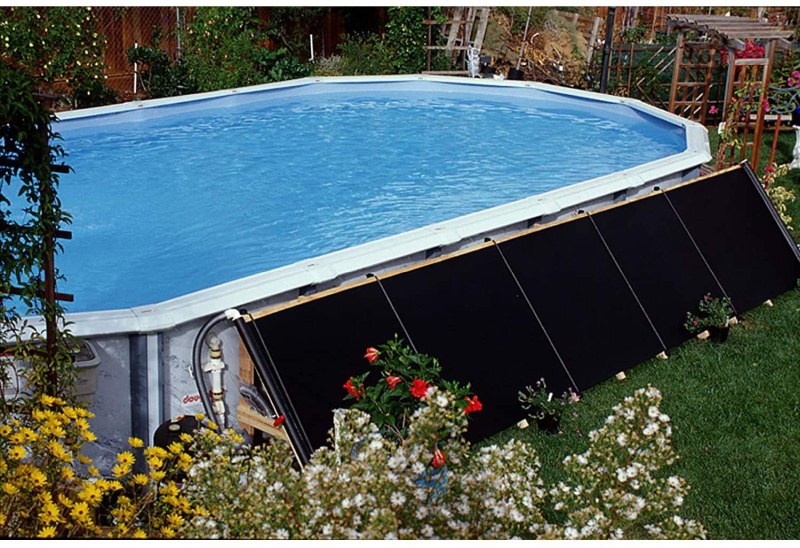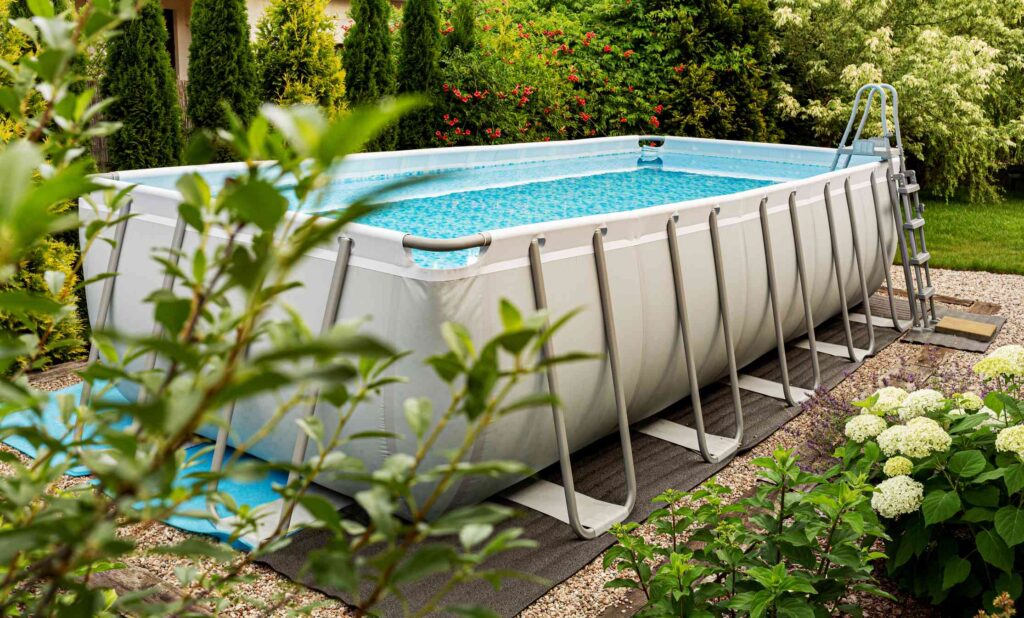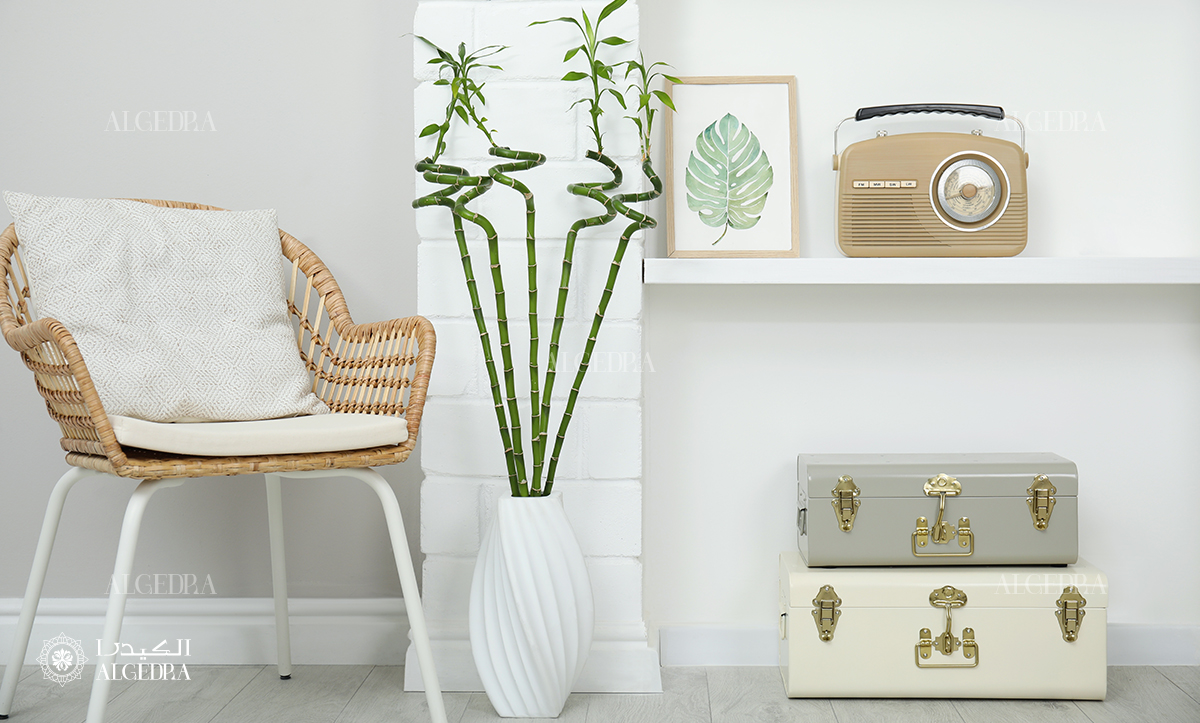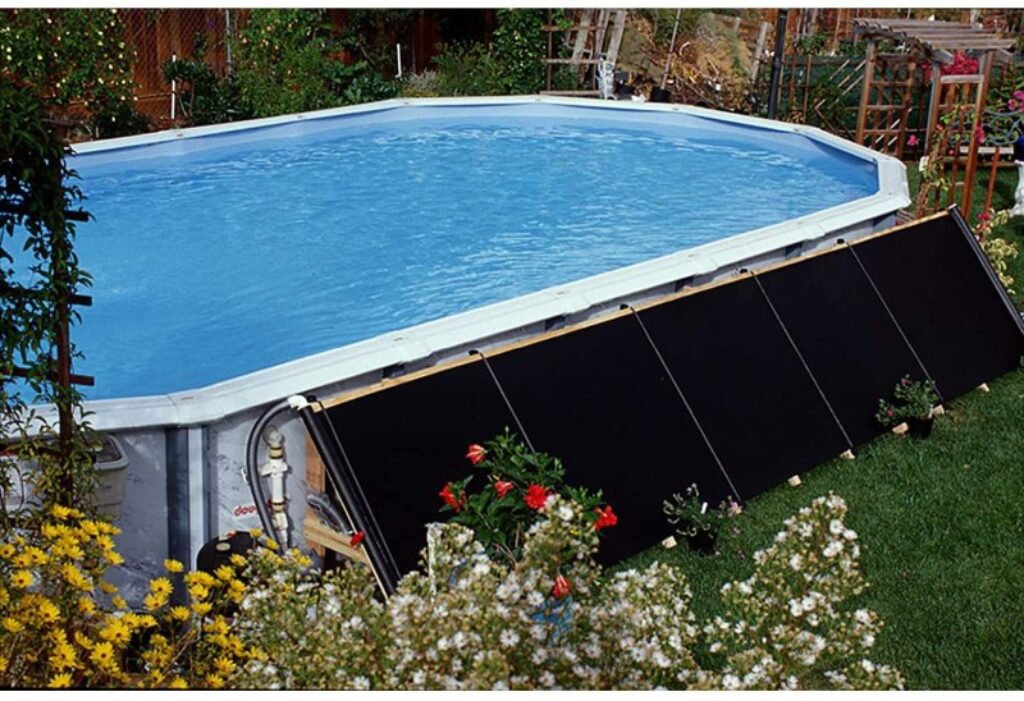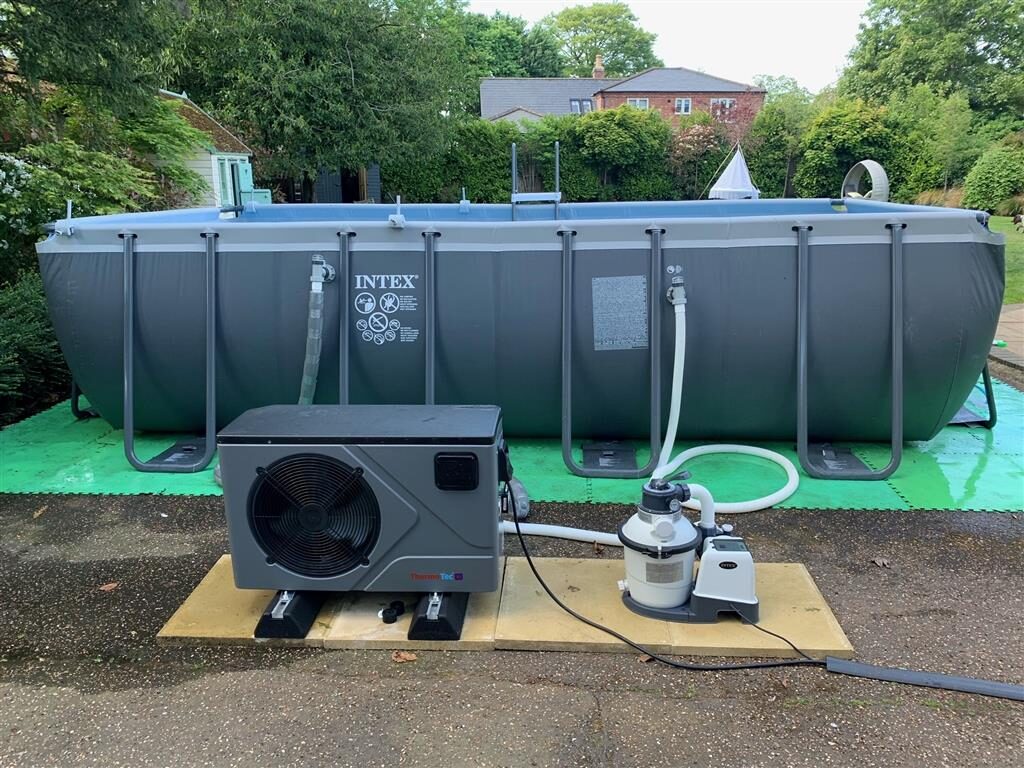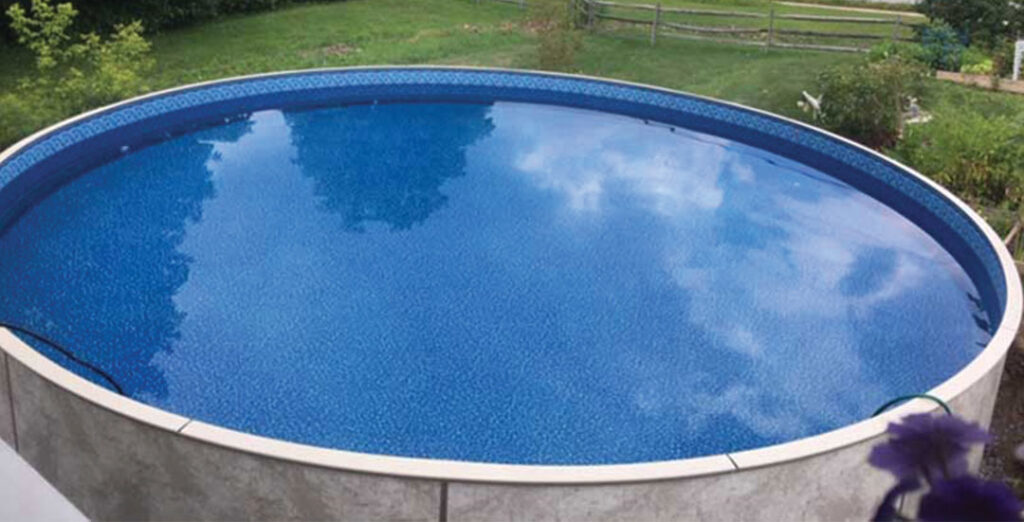If you’re looking to extend your swimming season and make the most out of your above ground pool, then you’ve come to the right place. In this article, we will explore the various heating options available for your pool, allowing you to enjoy a comfortable swim even during the cooler months. From solar heaters to heat pumps, we will discuss the pros and cons of each option, helping you make an informed decision that best suits your needs and budget. So, let’s dive in and discover how you can make your above ground pool a year-round oasis of relaxation and fun!
This image is property of www.thespruce.com.
1. Solar Heating Options
1.1 Solar Covers
Solar covers are a popular and cost-effective option for heating your above ground pool. These covers are made of a special material that allows sunlight to pass through and heat up the water below. The cover acts as a barrier, preventing heat from escaping the pool during the night and cooler days. By using a solar cover, you can increase the temperature of your pool by several degrees, allowing you to enjoy it even on cooler days.
1.2 Solar Rings
Similar to solar covers, solar rings are designed to harness the power of the sun to heat your above ground pool. These rings are typically made of a durable plastic material and are placed on the surface of the pool. The rings work by absorbing sunlight during the day and transferring the heat to the water. They also act as a barrier, minimizing heat loss during the night. Solar rings are a convenient and affordable option for pool owners who want to extend their swimming season without incurring high energy costs.
1.3 Solar Panels
Solar panels are a more advanced and efficient option for heating your above ground pool. These panels are typically installed on the roof of your house or in a sunny area near the pool. They work by collecting sunlight and converting it into heat, which is then transferred to the pool water through a series of pipes. Solar panels can be expensive to install initially but can provide significant energy savings in the long run. They are a sustainable and environmentally-friendly choice for heating your above ground pool.
2. Heat Pumps
2.1 Electric Heat Pumps
Electric heat pumps are a popular and efficient option for heating above ground pools. These pumps work by extracting heat from the air and transferring it to the pool water. They require electricity to operate but can provide high heating efficiency, making them cost-effective in the long run. Electric heat pumps are easy to install and maintain, and they can heat your pool water quickly and effectively.
2.2 Gas Heat Pumps
Gas heat pumps, also known as gas pool heaters, use natural gas or propane to heat the pool water. These pumps are powerful and can quickly raise the temperature of your above ground pool, making them ideal for colder climates or larger pools. Gas heat pumps are more expensive to operate compared to electric heat pumps, but they can provide consistent and reliable heating regardless of the outside temperature. When choosing a gas heat pump, consider the availability and cost of natural gas or propane in your area.
2.3 Hybrid Heat Pumps
Hybrid heat pumps combine the best features of both electric and gas heat pumps. These pumps can switch between electricity and natural gas or propane depending on the conditions, allowing for optimal energy efficiency and cost savings. Hybrid heat pumps are versatile and can adapt to changing weather conditions, making them a reliable heating option for above ground pools. While they may have a higher upfront cost compared to other options, the long-term savings and flexibility make them a worthwhile investment.
3. Gas Heaters
3.1 Propane Gas Heaters
Propane gas heaters are a common choice for heating above ground pools. These heaters use propane as a fuel source to generate heat, which is then transferred to the pool water through a heat exchanger. Propane gas heaters are powerful and can quickly raise the temperature of your pool, making them ideal for colder climates or larger pools. However, it’s important to consider the availability and cost of propane in your area before investing in a propane gas heater.
3.2 Natural Gas Heaters
Natural gas heaters are another option for heating your above ground pool. These heaters are connected to your home’s natural gas supply and use it as a fuel source to generate heat. Natural gas heaters are efficient and can provide consistent heating for your pool. However, they require a natural gas connection, so it’s important to check if your home is equipped with a natural gas line and to consider the availability and cost of natural gas in your area.
4. Electric Heaters
4.1 Electric Resistance Heaters
Electric resistance heaters, also known as electric pool heaters, use electricity to generate heat for your above ground pool. These heaters work by passing an electric current through a heating element, which then heats the pool water. Electric resistance heaters are easy to install and operate, and they can quickly heat your pool to a comfortable temperature. However, they can be more expensive to operate compared to other heating options, so it’s important to consider the long-term energy costs.
4.2 Electric Heat Exchangers
Electric heat exchangers are a more energy-efficient option for heating your above ground pool. These devices work by transferring heat from an external source, such as your home’s heating system, to the pool water. The heat is transferred through a series of pipes and coils, allowing for efficient heating without the need for direct electricity consumption. Electric heat exchangers are a sustainable and cost-effective choice for pool owners who want to minimize their energy usage.
This image is property of cdn.homedit.com.
5. Wood-Burning Heaters
5.1 Traditional Wood-Burning Heaters
Traditional wood-burning heaters are an alternative heating option for above ground pools. These heaters use firewood as a fuel source to generate heat, which is then transferred to the pool water. Wood-burning heaters can provide a rustic and cozy ambiance while heating your pool, making them a popular choice for outdoor enthusiasts. However, it’s important to consider the availability of firewood in your area and the environmental impact of burning wood for heating.
5.2 Wood Pellet Heaters
Wood pellet heaters are a more modern and efficient version of traditional wood-burning heaters. These heaters utilize small wood pellets as a fuel source, providing consistent and controlled heat for your above ground pool. Wood pellet heaters are easy to use and maintain, and they produce minimal emissions compared to traditional wood-burning heaters. However, it’s important to ensure a steady supply of wood pellets and to consider the initial costs of purchasing the heater and pellets.
6. Heat Exchangers
6.1 Plate Heat Exchangers
Plate heat exchangers are a type of heat exchanger commonly used for heating above ground pools. These exchangers consist of multiple plates with channels for the pool water to flow through. The plates transfer heat from an external source, such as a boiler or solar panels, to the pool water through conduction. Plate heat exchangers are known for their high efficiency and compact size, making them a popular choice for pool owners who want to maximize their heating capacity without taking up too much space.
6.2 Tube Heat Exchangers
Tube heat exchangers, also known as shell and tube heat exchangers, are another option for heating your above ground pool. These exchangers consist of a series of tubes enclosed in a larger shell. The pool water flows through the tubes, while the external heat source circulates around the tubes, transferring heat to the pool water. Tube heat exchangers are durable and versatile, making them suitable for a wide range of heating applications. They are especially useful for pool owners who require high heating capacity or want to connect the system to their home’s central heating system.
This image is property of heatpumps4pools.com.
7. Geothermal Systems
7.1 Ground Source Heat Pumps
Ground source heat pumps, also known as geothermal heat pumps, utilize the stable temperature of the Earth to heat your above ground pool. These pumps extract heat from the ground and transfer it to the pool water through a heat exchanger. Ground source heat pumps are highly efficient and can provide consistent heating throughout the year, regardless of the outside temperature. They are environmentally-friendly and can significantly reduce energy consumption compared to other heating options. However, the installation costs of ground source heat pumps can be high, so it’s important to consider your budget and the feasibility of installing the necessary ground loops.
7.2 Water Source Heat Pumps
Water source heat pumps, also known as lake or pond heat pumps, utilize the heat energy from a nearby water source to heat your above ground pool. These pumps extract heat from the water and transfer it to the pool through a heat exchanger. Water source heat pumps are efficient and can provide reliable heating, especially if you have access to a large body of water with a stable temperature. However, it’s important to assess the availability and accessibility of a suitable water source before considering this option.
8. Choosing the Right Heating Option
When choosing the right heating option for your above ground pool, there are several factors to consider.
8.1 Size and Efficiency
Consider the size of your pool and the desired heating capacity. Larger pools may require more powerful heating options to effectively raise the temperature. Additionally, assess the efficiency of each heating system to ensure that it can meet your heating needs while minimizing energy consumption.
8.2 Initial and Operating Costs
Evaluate the initial investment and operating costs associated with each heating option. Some systems, such as solar heaters, may have higher upfront costs but result in substantial long-term savings through reduced energy bills. Compare the cost-effectiveness of each option within your budget.
8.3 Maintenance and Longevity
Consider the maintenance requirements and longevity of each heating system. Some options may require regular maintenance or replacements, while others may have longer lifespans and minimal upkeep. Assess the availability of local repair and maintenance services for each option.
This image is property of www.swimmingpool.com.
9. Considerations for Above Ground Pools
When considering heating options for above ground pools, it’s important to take into account certain factors specific to these types of pools.
9.1 Pool Size and Volume
The size and volume of your above ground pool will directly impact the heating capacity required. Larger pools may need more powerful heating systems to effectively raise the temperature. Consider the dimensions of your pool and calculate the volume to determine the appropriate heating option.
9.2 Pool Location and Sun Exposure
The location of your above ground pool and its exposure to sunlight will affect the effectiveness of solar heating options. Ensure that the pool is positioned in an area that receives ample sunlight throughout the day for optimal solar heating. If your pool is situated in a shaded area, alternative heating systems may be more suitable.
9.3 Insulation and Pool Covers
Investing in proper insulation and pool covers can significantly impact the efficiency of your heating system. Insulating the pool walls and bottom with suitable materials can help reduce heat loss. Additionally, using a pool cover when the pool is not in use can prevent heat dissipation, further maximizing the effectiveness of your heating system.
10. Installing and Using Heating Systems
Once you have chosen the right heating system for your above ground pool, it’s important to follow proper installation and usage guidelines to ensure its effectiveness and longevity.
10.1 Follow Manufacturer’s Instructions
Carefully read and follow the manufacturer’s instructions when installing and operating your chosen heating system. This will help ensure that the system is set up correctly and that it functions optimally.
10.2 Connecting and Placing Equipment
Properly connect all components of the heating system, including pipes, pumps, and valves. Ensure that the equipment is placed in a suitable location that allows for efficient operation and easy maintenance. Consider the proximity to power sources, water sources, and ventilation requirements.
10.3 Effective Pool Maintenance
Regular pool maintenance is essential for the smooth operation of your heating system. Keep the pool clean and balanced, and regularly check for any leaks or malfunctions in the heating equipment. Schedule routine inspections and servicing to address any issues promptly and ensure the longevity of your heating system.
By considering the various heating options available and understanding the specific requirements of your above ground pool, you can choose the most suitable heating system to extend your swimming season and enjoy your pool year-round.
